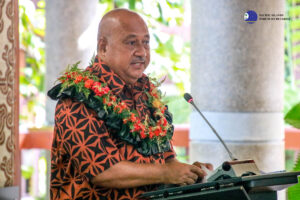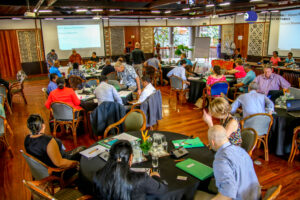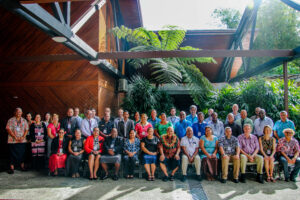Opening Remarks by the Hon. Ratu Inoke Kubuabola, Minister of Defence and National Security, Fiji at the Biketawa Plus Workshop (Suva)
Remarks and Speeches
19 June 2018
- Home
- Publications
- Opening Remarks By The Hon. Ratu Inoke Kubuabola, Minister of Defence and National Security, Fiji At The Biketawa Plus Workshop (Suva)

OPENING ADDRESS BY HON RATU INOKE KUBUABOLA, MINISTER OF DEFENCE AND NATIONAL SECURITY, FIJI, TO THE PACIFIC ISLANDS FORUM MEMBERS WORKSHOP ON THE BIKETAWA PLUS SECURITY DECLARATION
PIFS CONVENTION CENTER, SUVA, FIJI
18 JUNE 2018 AT 0900H
Excellencies; Distinguished Senior Officials of Forum Member Countries; Heads and Representatives of CROP Agencies and Regional Law Enforcement Secretariats; The Secretary General of the Pacific Islands Forum Secretariat and Officials; Ladies and Gentlemen. Ni sa bula vinaka and a good morning to you all! On behalf of the people and the Government of Fiji, I welcome you to Suva. It is indeed an honour to be here and speak to you on the occasion of the Pacific Islands Forum Workshop on Biketawa Plus. In addressing you this morning, I am reminded of our Pacific vision under the Framework for Pacific Regionalism which is “…for a region of peace, harmony, security, social inclusion, and prosperity, so that all Pacific people can lead free, healthy and productive lives..”. The 2017 State of Pacific Regionalism Report points out two key trends affecting our Pacific vision. Firstly, the region is becoming increasingly crowded and complex. We are seeing the growing interest in our region from both traditional and non-traditional partners, including civil society and private donors. Some view the arrival of non-traditional partners into the region as a security risk. Others see this as an opportunity for Pacific Islands Countries to benefit from new relationships. Some argue that this interest by non-traditional partners is fueling a renewed interest by our traditional partners in our region. Secondly, we are seeing shifts in global power and the erosion of multilateralism. Some observers have predicted that China will surpass the US as the world’s largest economy by 2032. Some view BREXIT and the US withdrawal from TPP and its reversion to protectionist policies around some sectors of its economy as the gradual erosion of multilateralism as we know it. There is agreement that at the very least a recast of the current neo-liberal global order is occurring. Against this backdrop, the World Economic Forum’s 2018 Global Risk Report points out that the world is entering a period of intensified risk. It states that the pace of change across the world is accelerating. Relevant to our region is the heightened risk of natural catastrophes, increased frequency and severity of extreme weather events as a result of climate change, addressing demographic changes such as our growing youth bulge, planning for the challenges of expanding urban populations and the shifting geopolitical landscape. We as a region must contend with this strategic context and more! It is important therefore that Pacific Island Countries are able to independently and collectively navigate through these current and future challenges. Since the establishment of the Pacific Islands Forum in 1971, our Leaders have continuously discussed the importance of maintaining and enhancing regional security and stability. Without this, our collective political and developmental aspirations are put at risk. No one Forum Member can achieve security by itself. We require each other because we depend upon one another. This commitment to assist one another in times of need or to address security threats in our region is not new. There are many worthy examples of this ‘Pacific’ commitment ranging from Papua New Guinea’s assistance to Vanuatu during the Santo rebellion in 1980; the peace monitoring group to Bougainville in the late 90’s consisting of Australia, New Zealand, Fiji and Vanuatu; and more recent examples of the Pacific Regional Assistance to Nauru (PRAN) from 2008 to 2009 and the 14 year long Regional Assistance Mission to the Solomon Islands. The Regional Assistance Mission to the Solomon Islands (RAMSI), which concluded last year, is the most prominent example of regional security cooperation in our region. All Pacific Island Countries were able to contribute to RAMSI’s success. This truly Pacific approach worked well to restore law and order, peace and stability to the Solomon Islands. With the drawdown of RAMSI, our Members are looking at ways to maintain momentum on regional security cooperation and coordination. Notwithstanding these responses to political or governance crises, Pacific Island Countries, have also relied and looked to one another for assistance during times of disaster. The 2009 tsunami in Samoa, TC Pam in Vanuatu, TC Winston in Fiji and recently TC Gita in Tonga, have all seen us reach out a helping hand in whatever manner we can to our affected Pacific peoples. Sub-regional efforts are also important in ensuring broader regional security. The Melanesian Spearhead Group for instance is pursuing a MSG formed police unit for possible deployment on UN type peacekeeping operations. This November, during the APEC summit in Papua New Guinea, the MSG will deploy a Formed Police Unit, consisting of 30 personnel with participation from Fiji, Solomon Islands and Vanuatu to assist the Royal Papua New Guinea Constabulary. In addition, the MSG Regional Police Academy through the Fiji Police Force has been offering capacity building programs to MSG and non-MSG countries. I also note the initiative shown by the Micronesian Presidential Summit in pursuing a revamped Micronesian Transnational Crime Unit in light of the increasing transnational security challenges they face. In 2017, the Forum Foreign Ministers Meeting discussed a number of political and security issues. They were mindful of the current shifts in relations between global powers, the ongoing challenges to multilateralism signalled by BREXIT and the US withdrawal from the TPP. They were also concerned over the increasing incidence of transnational crime and illegal fishing in the region. In order to effectively address existing and emerging security threats, around our health, the environment, human security and cyber security, Ministers emphasised the importance of enhancing regional security cooperation. Given this context, the Forum Foreign Ministers considered that it was timely to build on the Biketawa Declaration and other security related declarations. In their 48th meeting in Apia last September, Leaders considered the need to expand and strengthen collective action for regional security and agreed to build on the Biketawa Declaration and other Forum security declarations as a foundation for strategic future regional responses. Leaders also recognised that the Forum needed to address an expanded concept of security which mirrors our current regional security context, inclusive of human security, humanitarian assistance, prioritizing environmental security and building resilience to disasters and climate. Cooperation is vital for maintaining and enhancing our regional security. Not only cooperation between Forum Members themselves and relevant regional stakeholders, but also with our dialogue partners, both traditional and non-traditional. Given our crowded and complex region and the current fluidity of the geopolitical environment, the Forum will need to be able to de-conflict the growing strategic competition and cooperation that is already taking place. We need to be able to demonstrate what our strategic security interests and objectives are, in the face of competing external interests, which may or may not be complementary to the achievement of our vision for our Region. The development of Biketawa Plus is therefore an opportunity and a vital determinant of what our regional security priorities and interests will be over the coming years. I therefore encourage all of you to ask: How do we leverage the Blue Pacific narrative? How do we collectively engage and advocate for our determined and prioritised security interests? How do we ensure that we develop the necessary mechanisms for enhanced security cooperation? As a Minister of Defence and National Security, I would like to see clear actionable statements around how we will be able to collect and share security information as a region. How can we build trust and the assurance to enable this information sharing? Biketawa Plus should be about prevention as much as it is about response. How can we better monitor, assess and provide advice on addressing potential drivers and sources of conflict in our region? How do we build a better understanding of peace and security across our communities and countries? How can these regional approaches be linked to national security policies, plans or strategies? I view the development of Member specific national security policies as the building blocks to securing our Blue Pacific and maintaining a region of peace, security and stability. In 2010, Fiji endorsed its first National Security Strategy. The strategy espoused a whole of government approach to managing security issues inclusive of human security, environmental security and other non-traditional security challenges. Fiji is currently undergoing a process of reviewing and revitalising its national security and defence posture. The new National Security Strategy will provide the basis for establishing a strong, effective, and modern architecture and system that has the capacity and capability of responding to the evolving security needs of Fiji. The Fijian Government’s priority is to develop a strategy that would safeguard the national security of Fiji’s communities and her people. I believe other Pacific Island Countries have developed their own national security policies or are in the process of doing so. On this note, I would encourage all Forum Members to develop national security policies. This process will challenge us to think about what our security interests are, what our strategic value is, and how we go about securing this for current and future generations. By deciding our national security interests, I believe we will be able to build the foundation for determining and pursuing our collective or regional security interests in a more coherent and cohesive manner. Over the next two days, as you discuss the development of Biketawa Plus, I urge you to be mindful or our current and projected geopolitical environment, carefully consider what drives our regional security landscape now and into the future, and sincerely discuss how we as Members, CROP agencies and regional law enforcement secretariats will cooperate more effectively to address our regions expanded concept of security. At the heart of all this is ensuring that this new declaration will enable us to work better collectively to forge a secure and stable environment that will enable all our Pacific peoples to live free and worthwhile lives. Excellencies and distinguished officials! The region looks forward with great anticipation to a new regional security declaration that is fit for purpose, robust yet flexible and entrenches the deeper and stronger cooperation required from us all! Once again, I thank you for inviting me to address you this morning. I wish you all the best in your deliberations over the coming days. Vinaka vakalevu!


Explore other publications

Media Releases and News
15 October 2024

Statements
14 October 2024

Remarks and Speeches
10 October 2024